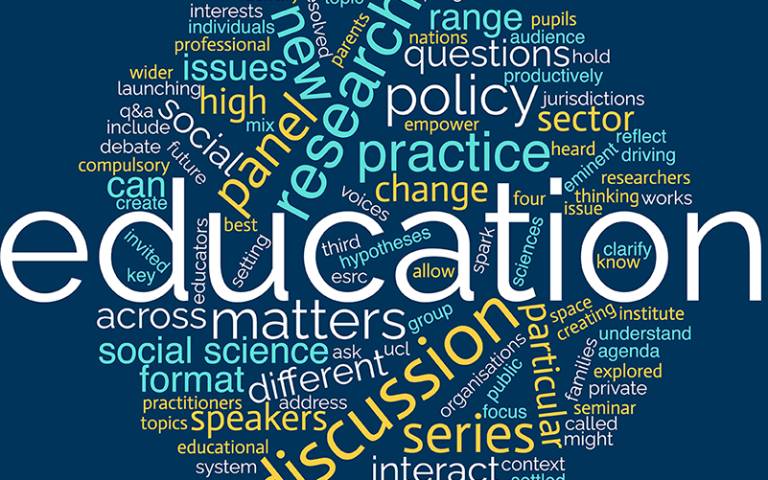The fifth seminar in the What Matters in Education? panel discussion series focused on what the priorities for the next Secretary of State for Education should be, following the 2024 election.
Education after the election: priorities for change
Introduction
Speakers drew on their knowledge, research and experience of different ages and stages in education across the UK to set out a research-informed agenda for change.
Key questions for debate
- How to recognise the social value of education?
- How to better resource families living in poverty?
- How to prepare all students with the skills they need for the future?
- How to maximise the contribution HE can make to creating a sustainable world
- Why reclaim teacher professionalism
| Opening topics | Speakers |
|---|---|
Schools post-covid - remembering the social value of education | Gemma Moss |
Addressing family income directly; and improving access | Claire Cameron |
Getting the right skills to underpin the economy of the future – | Olly Newton |
Higher education and sustainability | Tristan McCowan |
Teacher education, research and practice: addressing the recruitment | John Yandell |
Panel discussion chairs: Ann Phoenix, Professor of Psychosocial Studies, UCL Thomas Coram Research Unit; and Elaine Unterhalter, Professor of Education and International Development, UCL Institute of Education.
What we heard - key challenges facing education
- The social value of education
- During the pandemic schools responded quickly to the difficult circumstances pupils and their families faced.
- Policymakers neither saw nor understood the issues on the ground.
- System oversight focused on attainment data alone ignores the social value of education
- This needs to change.
- Poverty and children’s life chances
- Nearly a third of children (4.2 million) are living in poverty in the UK. This has a corrosive effect on their health and education.
- Families cannot easily access the financial support they need.
- Appropriate childcare provision is patchy and not easy to find.
- The most vulnerable families are at most risk.
- Investing in skills
- Shortages of technical and transferable skills (22% of vacancies in 2017, 33% in 2023) cost the economy over £6 billion.
- There are not enough apprenticeship opportunities to fill those gaps.
- To solve the skills problem government and employers need to act together.
- Higher Education (HE)
- There is a funding crisis in HE.
- Universities have the means to tackle complex social issues like poverty and the climate emergency.
- The lack of public funding limits the contribution they can make for the common good.
- This matters more than the benefits that flow to individual graduates post-degree.
- Teacher education, research and practice
- There is a crisis in teacher retention and recruitment in England.
- The limited room teachers have to exercise professional judgement in their classrooms is an important factor here.
- Changes to Initial Teacher Education have compounded matters by limiting the knowledge considered relevant to the role.
Questions the audience raised
Is more funding and investment the only solution to address the current challenges facing the system?
How to navigate the tension between the ‘needs’ of the economy and the social value of education
Do we need the new government to take a revolutionary or evolutionary approach to education reform?
Ways to bring about change
The panellists agreed that if education is to make a substantial difference in people's lives, then we need to think about public value; we need to think about equity; we need to think about the ways in which we plan for the future and learn from the past.
Actionable insights from the panel:
- Rebuild connections across and beyond the education field
- Community connectedness matters. Schools are anchor institutions that help people feel that they belong to a local area, and can have a part in shaping it.
- Schools can either work to a narrowly educational remit or take a broader role in relation to health, nutrition, and community cohesion.
- Research can help build a connectivity across sectors and levels that adds value to what policy makers and practitioners do.
- Research engagement should be based on dialogue that respects others’ interests.
- It should not be driven top down, on extractive or paternalistic principles. There is work for universities to do here.
- Invest in local intelligence
- We need to rebuild the connections we’ve lost, across a local authority, between service providers, and through education business partnerships.
- This depends upon the time people spend on connecting with others, with common goals in mind.
- Efficient local planning happens in this way. This is a valuable resource. System fragmentation is a cost.
- Bringing together different departments of local authorities and community organizations active in a local area helps identify and then meet local needs.
- Learn from the past
- If we are not to repeat the mistakes of the past, we need an accurate assessment of the strengths and weaknesses of what has been tried.
- A historical perspective, based on knowledge, scholarship and research accumulating over time, can help counter-balance short term political expediency and the desire to put a political stamp on the business of the day.
- The Department for Children, Schools and Families, Sure Start children’s centres, the extended school day, the London Challenge - are all legacies from the last Labour government that are worth remembering.
- Disentangle education and economic strategies
- An economic strategy for the country is different from a strategy for education. Education is never only about economic growth. It fulfils much wider purposes than that.
- The insistence that only attainment outcomes matter is part of the reason why education offers so little to so many.
- Changing Progress 8, having a balanced scorecard for schools and colleges, introducing multimodal assessment, organising learning round projects that foster a diverse range of pupil skills, could all make a huge difference to what pupils learn and the benefits to the economy.
- More funding is needed particularly in the early years and in FE. Redirecting the money spent on subsidizing the for-profit EY sector or encouraging the growth of commercial education into mainstream education might help.
In brief
Change can happen. There are low-cost/ high impact actions that the government could take that would address many of the concerns raised here. There are reasons to be hopeful as well as cautious about what happens next.
References
To find out more about these issues, follow these links:
Responding to COVID-19, Briefing Note 3: Resetting educational priorities in challenging times
Skills shortages in the UK economy - 2024
Teacher education, research and practice: addressing the recruitment and retention crisis through the reassertion of professional judgement
 Close
Close




